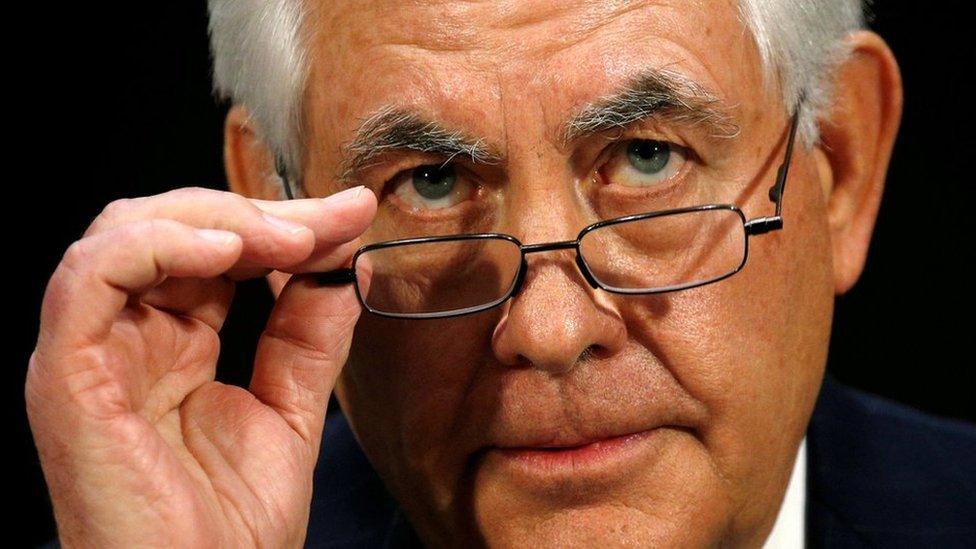Rex Tillerson: Trump foreign affairs pick narrowly backed
- Published

Mr Tillerson is the former chairman and chief executive officer of Exxon Mobil
The Senate Foreign Relations Committee has narrowly approved Rex Tillerson as US secretary of state, despite concerns about his business ties to Russia.
It split along party lines, with all 11 Republicans voting in favour and all 10 Democrats against. A full vote will now be held in the Republican-run Senate.
The move capped a busy day for the new Donald Trump administration.
Most notable was the US withdrawal from the Trans-Pacific Partnership, fulfilling a campaign pledge.
President Trump signed an executive order to pull out from the 12-nation trade deal that had been a linchpin of former President Barack Obama's Asia policy.
"Great thing for the American worker what we just did," Mr Trump said.
At the start of his first full week in office, the president also:
banned funding for international groups that promote abortions
froze the hiring of some federal workers
met corporate bosses and warned of border taxes levied on firms that outsource
picked Ajit Pai - a critic of "net neutrality" rules - to head the Federal Communications Commissions
blamed illegal ballots for his failure to win the popular vote, without offering evidence
promised to have a new Supreme Court nominee within two weeks
Also on Monday, the Senate confirmed Mike Pompeo as Mr Trump's CIA director.
Mr Pompeo's immediate task, correspondents say, will be to establish an effective relationship between the spy agency and Mr Trump.
What happened when Trump met corporate leaders
The president has been critical of the CIA for concluding that Russia had been actively working to influence the US presidential election in his favour.
In another development, new US Defence Secretary James Mattis said Washington had an "unshakeable commitment" to Nato, despite Mr Trump's earlier description of the military alliance as "obsolete".

Trump takes charge
Donald Trump had a busy first working day as president.

The Senate Foreign Relations Committee approved Mr Tillerson after leading Republican Senator Marco Rubio dropped his opposition.
Mr Rubio sparred with Mr Tillerson, a 64-year-old Texan oil executive, during confirmation hearings earlier this month, accusing him of being soft on Russia.
The former head of Exxon Mobil, Mr Tillerson knows Russian President Vladimir Putin through his business dealings.
Rubio has testy exchange with Tillerson about Putin
But Mr Tillerson has criticised Moscow for its annexation of Ukraine's southern Crimea peninsula in 2014.
Mr Rubio said that although he had doubts over the choice, he believed a new president was entitled to deference in assembling his cabinet.
"Despite my reservations, I will support Mr Tillerson's nomination in committee and in the full Senate," said Mr Rubio.
He had challenged Mr Tillerson over his refusal to call President Putin a "war criminal" over Russia's air strikes in Syria and his failure to condemn strongly enough human rights violations in Saudi Arabia and the Philippines.
Mr Rubio was among the candidates who fought Mr Trump in the battle for the Republican presidential ticket.
The partisan split in the voting is unusual. Traditionally, nominees for secretary of state have been approved by overwhelming votes from both parties.
Senator Ben Cardin, the committee's top Democrat, had said he would not vote for Mr Tillerson, also over his position on Russia as well as other issues.
Are Trump's nominees on the same page on Russia as their boss?
He also suggested that Mr Tillerson's "business orientation" could "compromise his ability as secretary of state to forcefully promote the values and ideals that have defined" America.
While critics raise concern about his ability to trade in his corporate interest for a national one, some supporters suggest the former CEO's background as a global dealmaker may bring fresh perspective to the nation's top diplomatic post.
At a closed doors meeting on Monday night, Mr Trump told congressional leaders he would have won the popular vote in the election if millions of undocumented immigrants had not voted illegally. He gave no evidence for the claim.
Democrat Hillary Clinton won nearly three million votes more than her opponent, who got more support in key swing states and won the electoral college.
But any notion of widespread voter fraud was widely rejected as untrue when Mr Trump made the same claim in November.